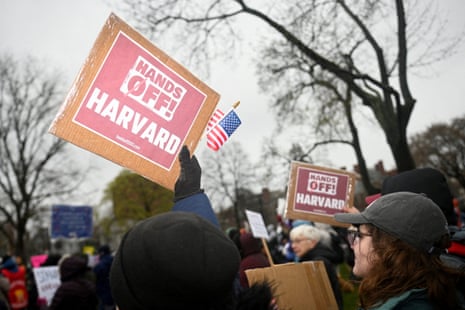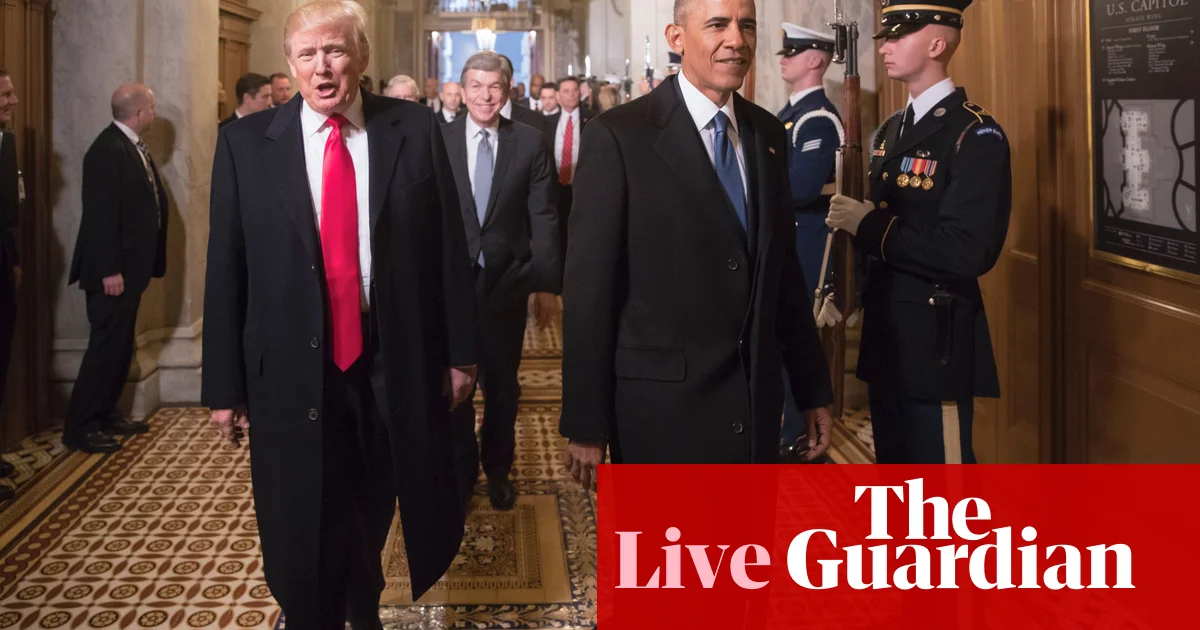Show key events only
Please turn on JavaScript to use this feature
Good morning and welcome to our US politics blog.
Former US president Barack Obama has condemned the education department for freezing $2.3bn in federal funds to Harvard University after the elite college rejected a list of demands from the White House.
In some of his most vocal criticism of this Trump administration, Obama praised Harvard, the country’s oldest university, for setting an example for other higher education institutions to reject federal overreach into its governance practices.
Harvard has set an example for other higher-ed institutions – rejecting an unlawful and ham-handed attempt to stifle academic freedom, while taking concrete steps to make sure all students at Harvard can benefit from an environment of intellectual inquiry, rigorous debate and mutual respect. Let’s hope other institutions follow suit.
His comments came after Harvard decided to fight the White House’s demands that it crack down on alleged antisemitism and civil rights violations. It is the first major US university to defy pressure from the White House to change its policies.
In a letter to Harvard on Friday, the administration called for broad government and leadership reforms, a requirement that Harvard institute what it calls “merit-based” admissions and hiring policies as well as conduct an audit of the study body, faculty and leadership on their views about diversity.

The Trump administration has said it is freezing more than $2bn (£1.5bn) in federal funds for Harvard University. Photograph: Nicholas Pfosi/Reuters
The demands, which are an update from an earlier letter, also call for a ban on face masks, which appeared to target pro-Palestinian protesters; close its diversity, equity and inclusion programs, which it says teach students and staff “to make snap judgments about each other based on crude race and identity stereotypes”; and pressured the university to stop recognizing or funding “any student group or club that endorses or promotes criminal activity, illegal violence, or illegal harassment”.
The administration also demanded that Harvard cooperate with federal immigration authorities.
Harvard’s president said in a letter that the university would not comply with the Trump administration’s demands to dismantle its diversity programming and to limit student protests in exchange for its federal funding.
“No government – regardless of which party is in power – should dictate what private universities can teach, whom they can admit and hire, and which areas of study and inquiry they can pursue,” Alan Garber, the university president, wrote, adding that Harvard had taken extensive reforms to address antisemitism.
The department of education announced in March that it had opened an investigation into 60 colleges and universities for alleged “anti-Semitic harassment and discrimination”. It came after protests against Israel’s war on Gaza were put on across campuses last year, demonstrations that many Republicans framed as antisemitic.
Harvard’s response to the White House’s demands was in sharp contrast to the approach taken by Columbia University, the epicentre of last year’s protests against Israel’s assault on Gaza.
The Trump administration cut $400m in grants to the private New York school, accusing it of failing to protect Jewish students from harassment. The school caved in to demands and responded by agreeing to reform student disciplinary procedures and hiring 36 officers to expand its security team.
Stay with us throughout the day as we have more reaction to this story and many others.
Show key events only
Please turn on JavaScript to use this feature
South Korea has announced plans to invest an additional $4.9bn in the country’s semiconductor industry, citing “growing uncertainty” over US tariffs.
“An aggressive fiscal investment plan has been devised to help local firms navigate mounting challenges in the global semiconductor race,” the finance ministry said.
“To foster a dynamic, private sector-led ecosystem for semiconductor innovation and growth, the government will increase its investment in the sector from 26 trillion won ($18.2bn) to 33 trillion won,” the ministry added.
Semiconductors are tiny chips that power just about everything, including computers, mobile phones and cars. They are central to the global economy. The UK, the US, Europe and China rely heavily on Taiwan for semiconductors.

Semiconductors are sometimes called microchips or integrated circuits. Photograph: Florence Lo/Reuters
But South Korea – Asia’s fourth largest economy – is also a major exporter to the US and concerns about the semiconductor sector have hit the Seoul-listed shares of the world’s largest memory chip maker Samsung, and largest memory chip supplier SK Hynix.
The statement of extra investment from South Korea’s finance ministry comes after the Trump administration launched investigations into imports of pharmaceuticals and semiconductors on national security grounds.
These industries – so far exempt from the 10% US import charges that began on 5 April – may face tariffs after the probes are complete.
US President Donald Trump has directed the US commerce department to conduct a three-week investigation into the imports, during which time public comments on the issue will be heard before a decision is made.
Trump said on Sunday he would be announcing a tariff rate on imported semiconductors over the next week, adding that there would be flexibility with some companies in the sector.
On 2 April, Trump announced sweeping tariffs on global trading partners, including the 25 percent on South Korean goods, before backtracking and suspending their implementation for 90 days.
Even so, “duties targeting specific sectors such as semiconductors and pharmaceuticals, remain on the horizon”, finance minister Choi Sang-mok said during a meeting.
“This grace period offers a crucial window to strengthen the competitiveness of South Korean companies amid intensifying global trade tensions,” he added.
Good morning and welcome to our US politics blog.
Former US president Barack Obama has condemned the education department for freezing $2.3bn in federal funds to Harvard University after the elite college rejected a list of demands from the White House.
In some of his most vocal criticism of this Trump administration, Obama praised Harvard, the country’s oldest university, for setting an example for other higher education institutions to reject federal overreach into its governance practices.
Harvard has set an example for other higher-ed institutions – rejecting an unlawful and ham-handed attempt to stifle academic freedom, while taking concrete steps to make sure all students at Harvard can benefit from an environment of intellectual inquiry, rigorous debate and mutual respect. Let’s hope other institutions follow suit.
His comments came after Harvard decided to fight the White House’s demands that it crack down on alleged antisemitism and civil rights violations. It is the first major US university to defy pressure from the White House to change its policies.
In a letter to Harvard on Friday, the administration called for broad government and leadership reforms, a requirement that Harvard institute what it calls “merit-based” admissions and hiring policies as well as conduct an audit of the study body, faculty and leadership on their views about diversity.

The Trump administration has said it is freezing more than $2bn (£1.5bn) in federal funds for Harvard University. Photograph: Nicholas Pfosi/Reuters
The demands, which are an update from an earlier letter, also call for a ban on face masks, which appeared to target pro-Palestinian protesters; close its diversity, equity and inclusion programs, which it says teach students and staff “to make snap judgments about each other based on crude race and identity stereotypes”; and pressured the university to stop recognizing or funding “any student group or club that endorses or promotes criminal activity, illegal violence, or illegal harassment”.
The administration also demanded that Harvard cooperate with federal immigration authorities.
Harvard’s president said in a letter that the university would not comply with the Trump administration’s demands to dismantle its diversity programming and to limit student protests in exchange for its federal funding.
“No government – regardless of which party is in power – should dictate what private universities can teach, whom they can admit and hire, and which areas of study and inquiry they can pursue,” Alan Garber, the university president, wrote, adding that Harvard had taken extensive reforms to address antisemitism.
The department of education announced in March that it had opened an investigation into 60 colleges and universities for alleged “anti-Semitic harassment and discrimination”. It came after protests against Israel’s war on Gaza were put on across campuses last year, demonstrations that many Republicans framed as antisemitic.
Harvard’s response to the White House’s demands was in sharp contrast to the approach taken by Columbia University, the epicentre of last year’s protests against Israel’s assault on Gaza.
The Trump administration cut $400m in grants to the private New York school, accusing it of failing to protect Jewish students from harassment. The school caved in to demands and responded by agreeing to reform student disciplinary procedures and hiring 36 officers to expand its security team.
Stay with us throughout the day as we have more reaction to this story and many others.
